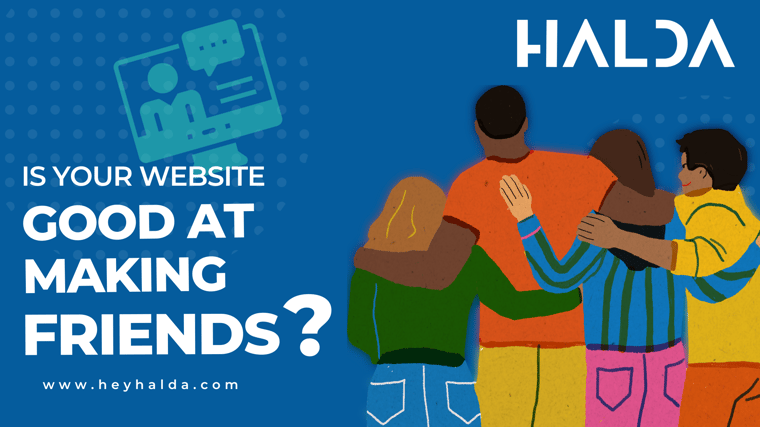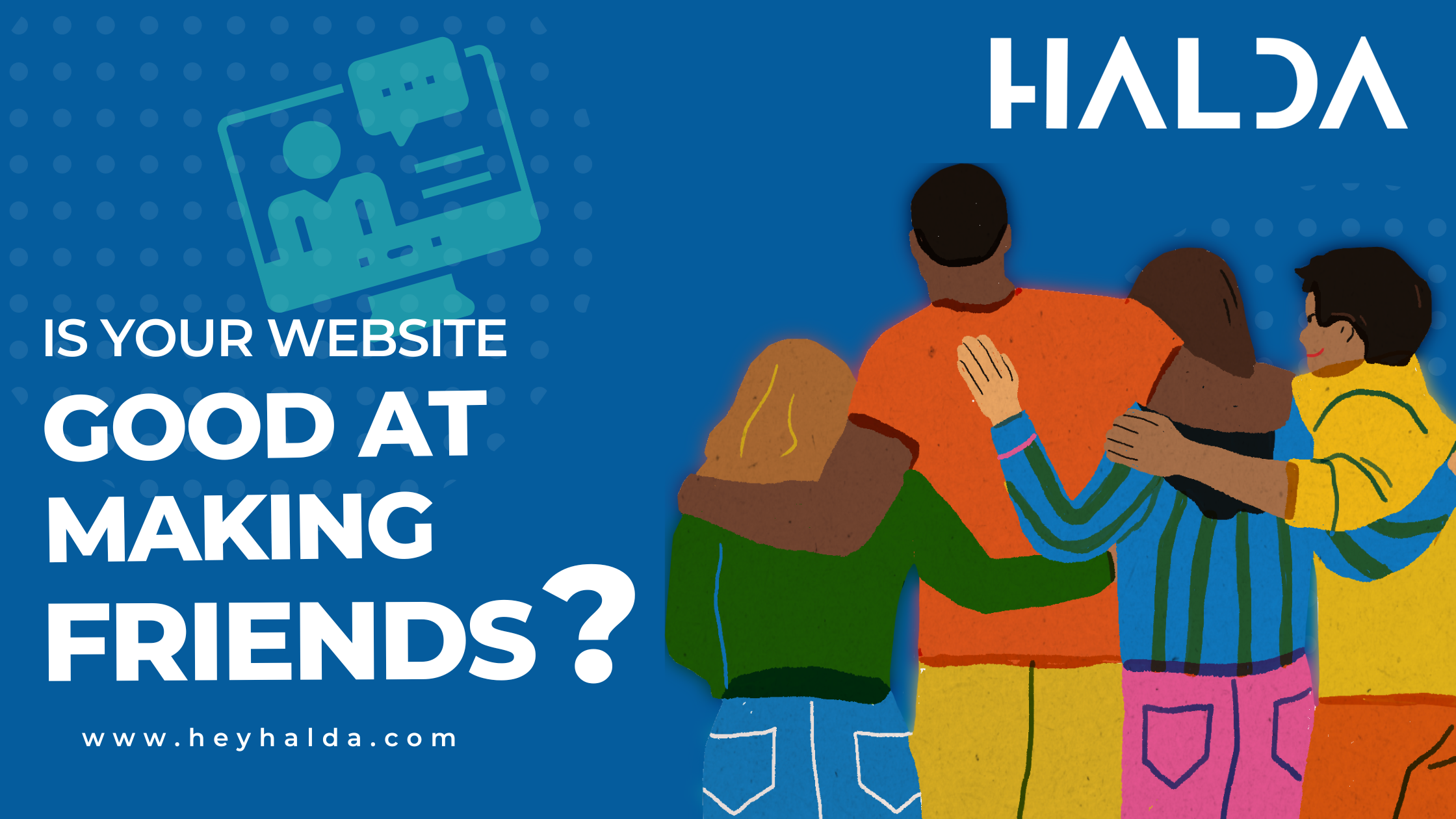Is Your Website Good At Making Friends?

Think of a party–scratch that–a college party. You know a few people, but it’s a big crowd, and it feels like you’re meeting everybody for the first time. That’s the funny thing about college, while many of those conversations won’t be more than five minutes of small-talk, some could be the beginning of lifelong connections.
Engaging with prospective students on your website is a lot like that college party. Students are searching for the people and places that will define the rest of their lives. Questions will be asked, impressions made, and a lot hinges on those first five minutes. So the critical question is: How good is your website at making friends?
The Party Fouls
At a party and on a website, the ability to build meaningful relationships depends on one factor: How you choose to present yourself. Your communication strategy, your look, your vibes, all combine into an impression that either draws people in or pushes them away. Here are some impressions you want to avoid making.
The Mirror 
How You Spot Them:
-Impersonal
-Bland
-Rehearsed
This is the people-pleaser. The Mirror floats from conversation to conversation with that saccharine smile telling everyone whatever he thinks they want to hear. “Oh you’re from Jersey, that’s awesome, Jersey is so awesome…Oh no, no I’ve never been there myself”...you’ve heard it all before. In this way the Mirror reflects its subject, always ready to say something relatable, but losing his own story as he scrambles to please everyone else. The Mirror is nice enough–he’s great at keeping the conversation going. But there’s nothing authentic or memorable about him, and in trying to be all things to all people he fails to truly connect with anyone.
Plenty of university websites take this approach. They overwhelm their audience with piles of information in hopes that they’ll meet everyone’s needs all at once. But they aren’t personalizing the experience for anyone, they aren’t really listening. Prospective students get the same extensive spieles and the same flood of PDFs as alumni, faculty, and current students. There’s no texture, no authentic interaction, and, therefore, no lasting connection.
This kind of website is a reason why 27% of graduating high school seniors claim that all colleges “look and sound alike”, while only 9% feel like they received personalized outreach. Blame the Mirror: nice enough but *sigh* utterly forgettable.
The Egotist
How You Spot Them:
-Self-promoting
-Competitive
-Tone-deaf
We all have an ego, but this person’s is so cumbersome and clumsy that it seems to take up all the space in the room. Simply put, everything is about them. There’s not a subject they can’t make about themselves and not a story they can’t one-up. You’ll leave the conversation with a pretty good sense of their resume, but little interest in bringing them on as a friend.
This kind of self-aggrandizing is often a college website’s biggest mistake. Institutions of higher learning do amazing things, but students already know that. And if they’re on your website, then they already think you’re cool. Your brand has drawn them in, your worth as an institution is likely baked into their mental equation. So stop talking about how great you are and start showing the students all the ways you want to help them. They already know who you are–that’s why they’re in the conversation–so give them the experience that they’re asking for.
The Cryptic (Accessibility/Clarity)
How You Spot Them:
-Guarded
-Manipulative
-Confusing
Mystery is the Cryptic’s only real social tool. Withholding information, obfuscating, quietly suggesting who they are without offering anything real. The idea is that they’re so inscrutable, so mysterious that they mystify and awe their audience. It’s good fun for the cryptic, but it’s also manipulative, and maybe even a little disdainful toward an audience that apparently doesn’t deserve transparency
Is there a worse approach for a university website? Probably not. But that doesn’t mean plenty of webpages don’t take on the Cryptic’s persona. Students visit the website with specific goals in mind. Burying important information like the cost of admission, scholarship opportunities, and credit load only frustrates them. 12% of university website visitors aren’t even prospective students, but parents or relatives trying to help the process of selecting a university. What impression does it send when they can’t find what they need?
Then, if they do find what they need, can they understand it? University websites can be so laced with jargon and terminology that it takes a degree to understand them. For instance, across university websites there are at least 136 unique terms for an unsubsidized student loan. That inconsistency is obscure and confusing to the basic web researcher. Make your language accessible, level the playing field, and give your visitors a chance to become your friends.
How to Actually Make Friends
We can agree that these folks are pretty much the worst, but why focus on the negatives when there’s so much fun to be had. There’s one particular personality that efficiently makes the right kind of friends, and–believe it or not–it works for websites, too.
The Fluent:
How to Spot Them:
Engaged
Gracious
Thoughtful
Relaxed
This person speaks the complex language of social interaction. The Fluent makes an effort to fully understand each person–their roots, what they like, what motivates them–then crafts a meaningful interaction. She meets others where they are and brings them closer to where they want to be. And when you speak to the Fluent, you feel like you’re the most important person in the room.
This is a hard skill to develop socially, but it’s even more impressive if a website can pull it off. That’s where Halda comes in. We don’t just provide a novel way to give and receive information, we craft interactions. Personalized content about your institution meets your potential students where they are and takes them where they want to be.
Our unique tool identifies:
-Who students are looking for.
-What they want to know.
-What content best suits their needs.
Then we serve up that content in readable, consumable chunks that connect with prospective students. It’s how we turn your website into a Fluent–how we make authentic connections that create bonds between your school and the next generation of applicants. And like any good connection, it doesn’t fizzle out after one party. We provide avenues for engagement throughout the funnel, so that by the time students commit they feel, well, like old friends.
Make Friends on Your University Website
Want to learn more about website personalization? Schedule a personalized demo, and let us show you what we can do to make your website "The Fluent" for your prospective students.


